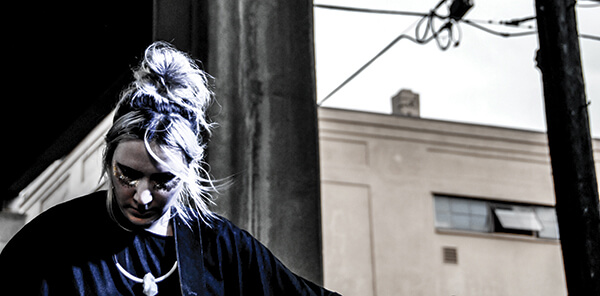When I decided to start a band in Portland, Oregon, I took for granted that I would find the open-minded, queer friendly feminists I was looking for. I had no doubt that the birthplace of Riot Grrrl would have a place for a queer, female drummer like myself. What I found, though, was that the legacy of the progressive, liberal, open-minded Pacific Northwest was more of a vague narrative that people attached themselves to in an empty, half-hearted way, without any real intention or conviction. Being a female musician in Portland can still feel like trying to join a boy’s club, if not treading on hostile territory.
Despite Portland’s progressive reputation and being home to all kinds of female and gender-queer musicians, men widely avoid making space for them in the music industry. One place in particular where men unapologetically dominate is within Portland’s metal scene.

Kira Clark is the vocalist and guitarist for the Portland band Muscle and Marrow [listen at https://muscleandmarrow.bandcamp.com]—a heavy, experimental, art rock band who mainly perform with metal bands and who are heavily entrenched in the metal scene. Clark says she has experienced persistent sexism within the metal scene since the band started out three years ago.
“There is just this masculine energy blanketing everything in heavy music,” she says. “I am consistently forced to inhabit my gender in a conscious way. My gender is a spectacle.” Clark, 29, speaks candidly about the many faces of sexism at metal shows. Sometimes it is hateful and overt. Other times it is less obvious, cloaked as advice from naïve male friends who mean well but who are unwilling to make the effort to understand just how pervasive the problem is. There are very few who openly stand with women or help to create an inclusive space for all musicians.
The most common kind of sexism Clark experiences is also the most blatant. At shows where her band is performing, Clark is often asked by security to leave the green room or the backstage area, because it is reserved for band members only.
“Some version of this happens implicitly and explicitly to me all the time. All the time,” she says. “I can’t speak enough about this, how small it makes me feel, how I’m told over and over that this space does not belong to me, that I have to prove myself again and again.”

Another time, a guy who was working sound at her show, messaged Clark on Facebook afterwards to call her a “spoiled bitch,” because, as she puts it, she asserted her needs in regards to her vocals. In a covert way, his actions illustrate an all too common resentment of women who ask for the same kind of consideration that men are automatically afforded.
Women are often fetishized and considered tokens rather than as serious musicians. This is evidenced by the way “female-driven” bands are considered their own genre and are relegated as niche.
Clark describes a time when her band was discussed in this way: “We had a particularly upsetting review where the introductory sentence was something like, It’s become quite a trend for women to front dark bands…and then proceeded to compare us to bluesy bands that have absolutely nothing in common with us, other than the fact that they are led by a female…We are over half the population. To imply that having a female in a band is a trend is inexcusable.”
Whether it is expressed as aggressive name-calling or as a subtle dismissal of the scope of female capability, experiencing this kind of gender bias is like having a rug pulled out from under you. It feels intensely personal, and there are very few men who are true allies or who will have our backs.
Apathy about sexism from our male friends can feel like a whole other kind of betrayal. Clark says that when she has spoken with men about her feelings of exclusion, they dismiss it and just tell her to care less, to “give less of a fuck.” There are the men who, in private conversation, are all for equality, but who do nothing to stand with women publically or call out sexism when they witness it. Whether it’s insensitivity or an unwillingness to make waves, apathy about sexism is just another way of being dismissive and exclusionary toward women.

So much of what Clark describes about her experience as a female musician in Portland resonates with me, and with so many other female musicians I know. There are so many ways in which we are told we don’t belong and that we are not valued. We’re shown by how we’re spoken to and written about, how we have to prove we can even be musicians, and how seldom we are taken seriously. “It is said over and over to me and other women,” Clark says, “that there is a limited space allotted for women to make art, whereas there can be thousands of bands with men who all sound similar and that’s okay because the space is much, much larger for them.”
I look forward to a time when the space for women’s art is not only provided happily, but automatically.
ABOUT THE AUTHOR
Elisabeth Wilson is a writer and musician living in Portland, OR.
